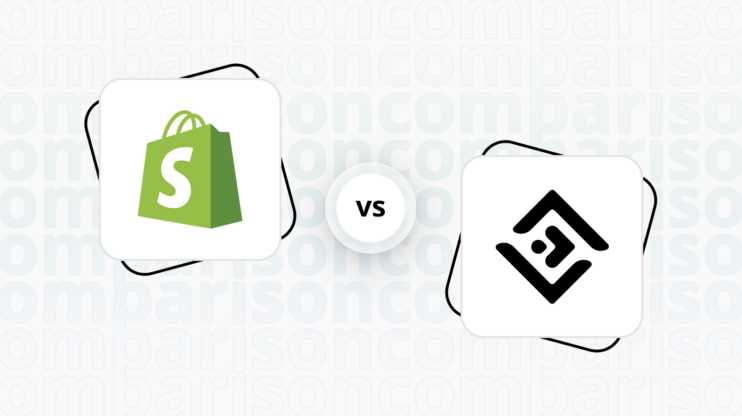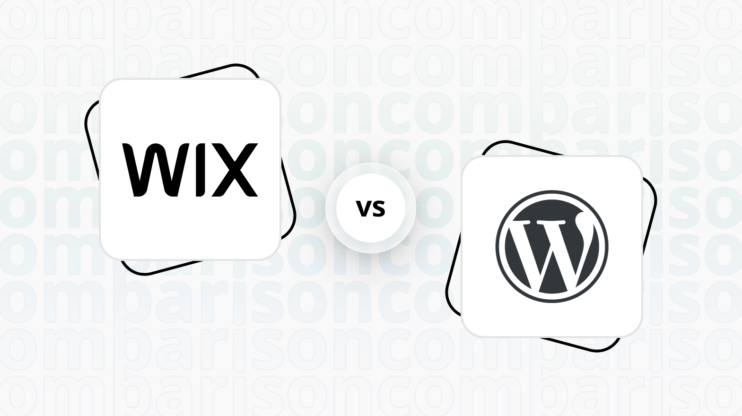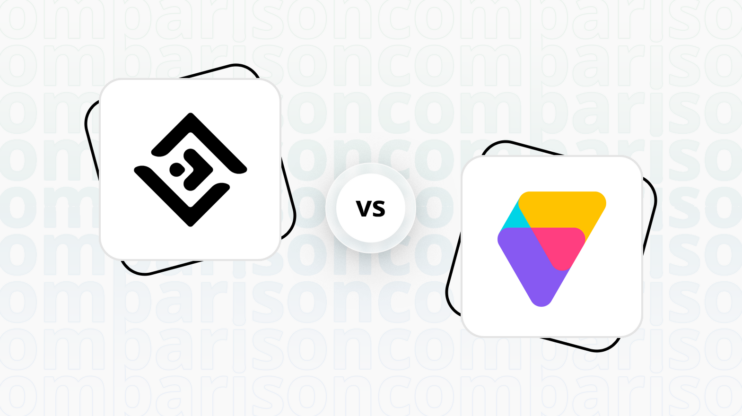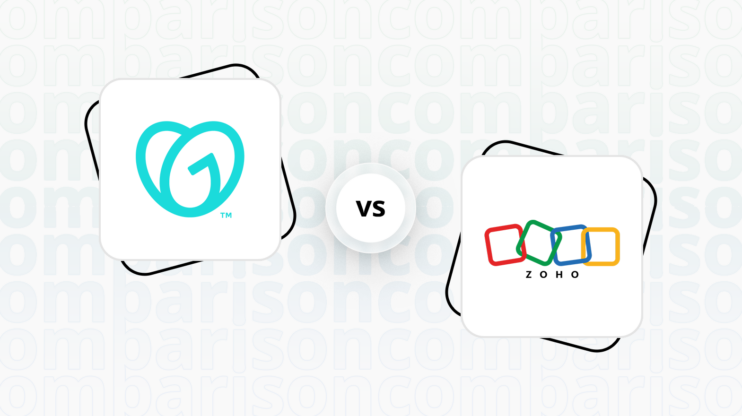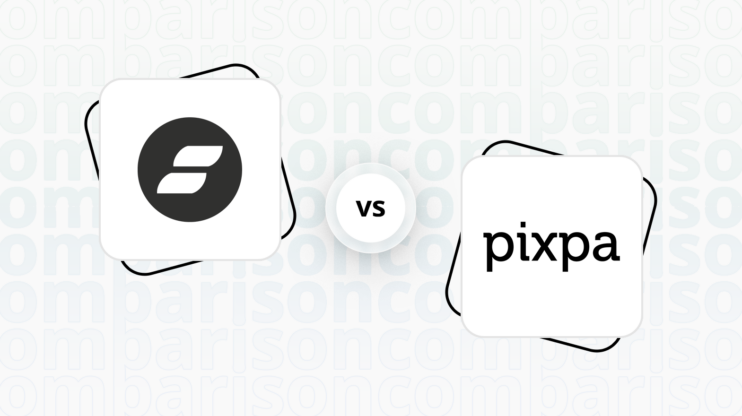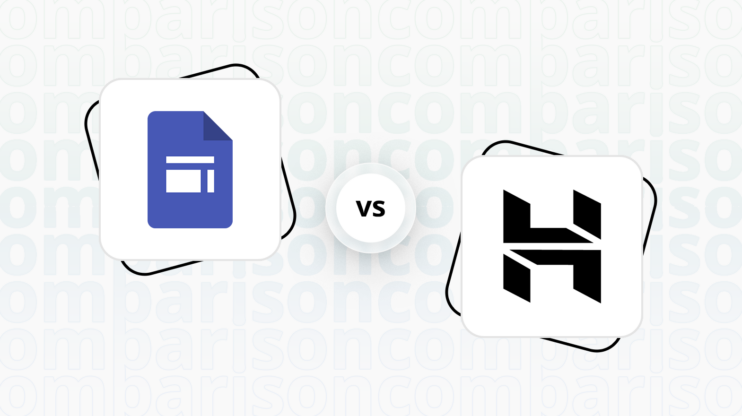Final verdict
Choosing between Shopify and Zoho Sites depends on your specific needs, with Shopify being the superior choice for ecommerce and Zoho Sites offering a solid option for general website building.
-
Shopify (Overall Grade: 8.1/10)
excels as an ecommerce platform, providing a comprehensive suite of tools for online store management, including advanced inventory management, a wide range of payment gateways, and robust marketing features. Its user-friendly interface, coupled with extensive learning resources and 24/7 customer support, makes it an ideal choice for businesses focused on growth and scalability in the ecommerce space. -
Zoho Sites (Overall Grade: 7.6/10)
, while not as ecommerce-focused as Shopify, offers a versatile website builder that integrates well with other Zoho products, making it a great choice for businesses already using Zoho’s ecosystem. Its user-friendly design, affordable pricing, and flexibility in website creation cater to a wide range of users, from bloggers to small businesses.

|
|
|
|---|---|---|
| Design Functionalities & Templates |
8.2 |
7.4 |
| Ease of use |
7.5 |
7.0 |
| Ecommerce |
9.2 |
7.4 |
| Website Editors |
7.9 |
7.5 |
| Product Testing Options |
8.1 |
8.8 |
| Price |
8.2 |
8.6 |
| Hosting Quality |
9.0 |
8.0 |
| Website Speed Optimization |
7.8 |
7.1 |
| Plugins and Integrations |
8.7 |
7.3 |
| Marketing Features |
8.8 |
7.6 |
| Customer Support |
8.6 |
8.3 |
| Security |
9.0 |
8.1 |
| AI Capabilities |
7.9 |
7.5 |
| User Management |
6.5 |
7.3 |
Best for ecommerce
 9.2
9.2
 7.4
7.4
Verdict
: Shopify shines as the superior choice for ecommerce with its robust features and scalability, making it ideal for businesses of all sizes. Zoho Sites, while versatile, is better suited for simpler ecommerce needs or those already invested in the Zoho ecosystem.
-
Shopify
: Dominates with its comprehensive ecommerce toolkit, including advanced inventory management, a wide array of payment gateways, and extensive customization options. It’s designed to support businesses as they grow, offering scalability and a rich set of features. -
Zoho Sites
: Offers basic ecommerce functionalities through its integration with Zoho Commerce, making it a viable option for those seeking simplicity or are already using Zoho’s suite of products. However, it lacks the depth of ecommerce features and scalability provided by Shopify.
Best for informational & business websites
 6.8
6.8
 7.9
7.9
Verdict
: Zoho Sites is better suited for informational and business websites, offering a more user-friendly platform and higher score in this category compared to Shopify.
-
Shopify
: Known for its ecommerce capabilities, Shopify can still support informational sites but may not be the ideal choice due to its focus on online stores. Its features and design options are tailored more towards ecommerce, which might not align perfectly with the needs of a purely informational or business website. -
Zoho Sites
: With a higher score for informational and business websites, Zoho Sites stands out as the preferred choice. It offers a wide range of customizable templates and a user-friendly editor, making it easier for users to create and manage websites for various purposes beyond ecommerce.
Detailed comparison
Design functionalities & templates
Design FunctionalitiesRepresents how well each platform allows for creative design and customization of websites.Score Components:
- Template Variety (30%): Range and quality of design templates.
- Customization (30%): Flexibility and options for design alterations.
- User Interface (20%): Ease and intuitiveness of the design process.
- Responsiveness (10%): Adaptability to different devices and screen sizes.
- Innovation (10%): Unique design features and tools.
 8.2
8.2
 7.4
7.4
🏆
Winner: Shopify.
If you’re looking for a platform that offers sleek and professional templates ideal for ecommerce sites, Shopify is the preferred choice.
Shopify’s templates offer a sophisticated look with a focus on online stores. While the free template selection is not large, Shopify’s premium theme store provides a variety of industry-specific options, offering advanced features for a strong brand presence.
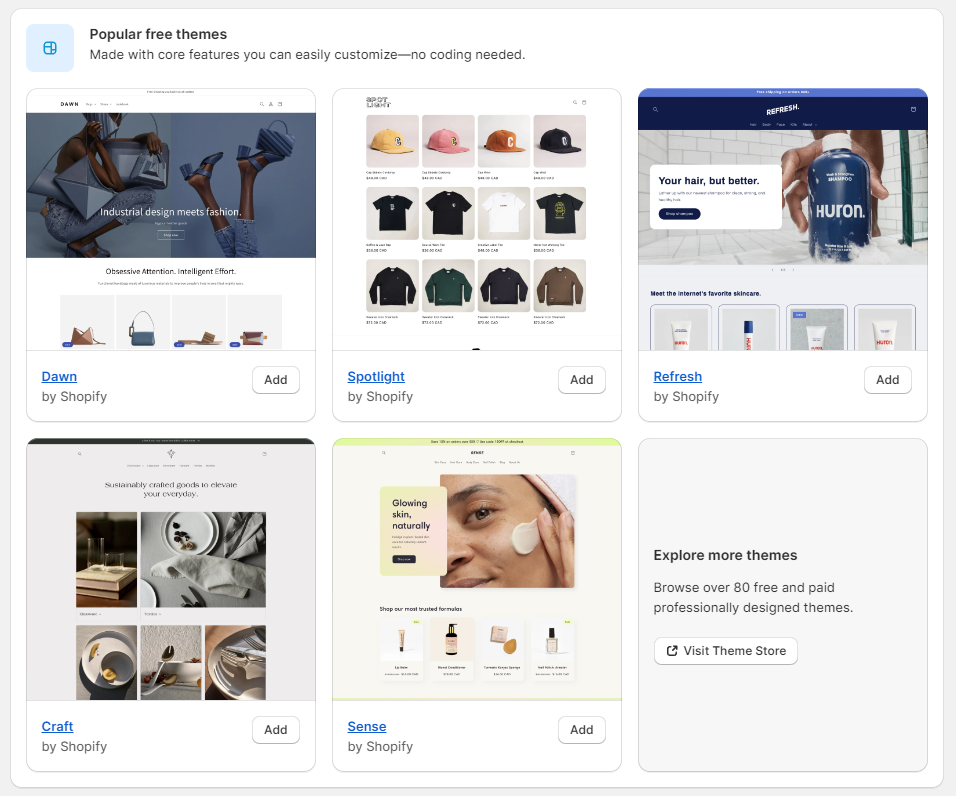
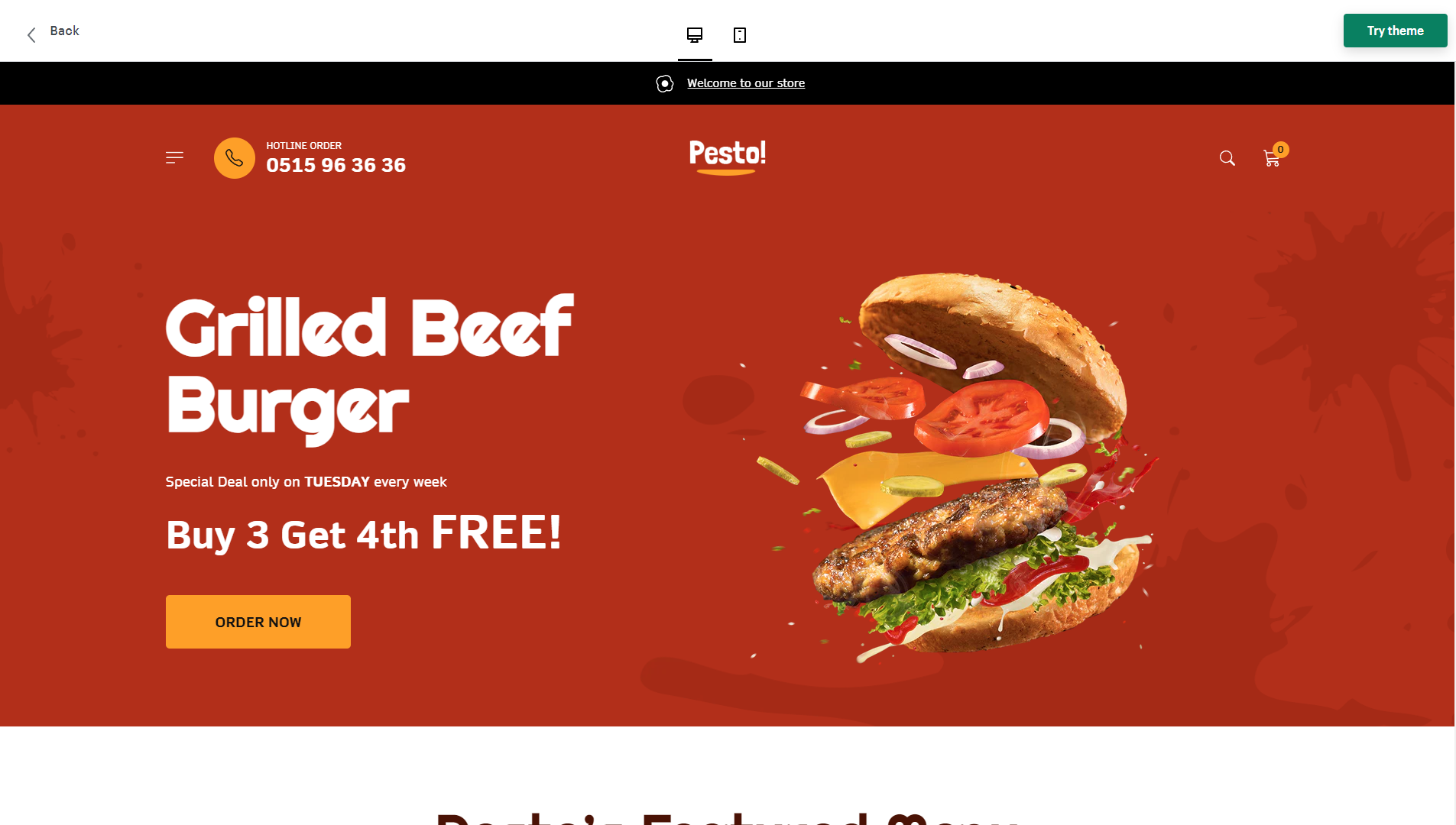
On the other hand, Zoho Sites offers a diverse collection of over 150 templates, thoughtfully categorized into industries like Restaurants, Architecture, Health, and more. Each template provides a pre-designed layout with responsive design for various screen sizes. Customization options include visual elements such as colors, fonts, and images, as well as the ability to modify layouts and content using the visual editor.
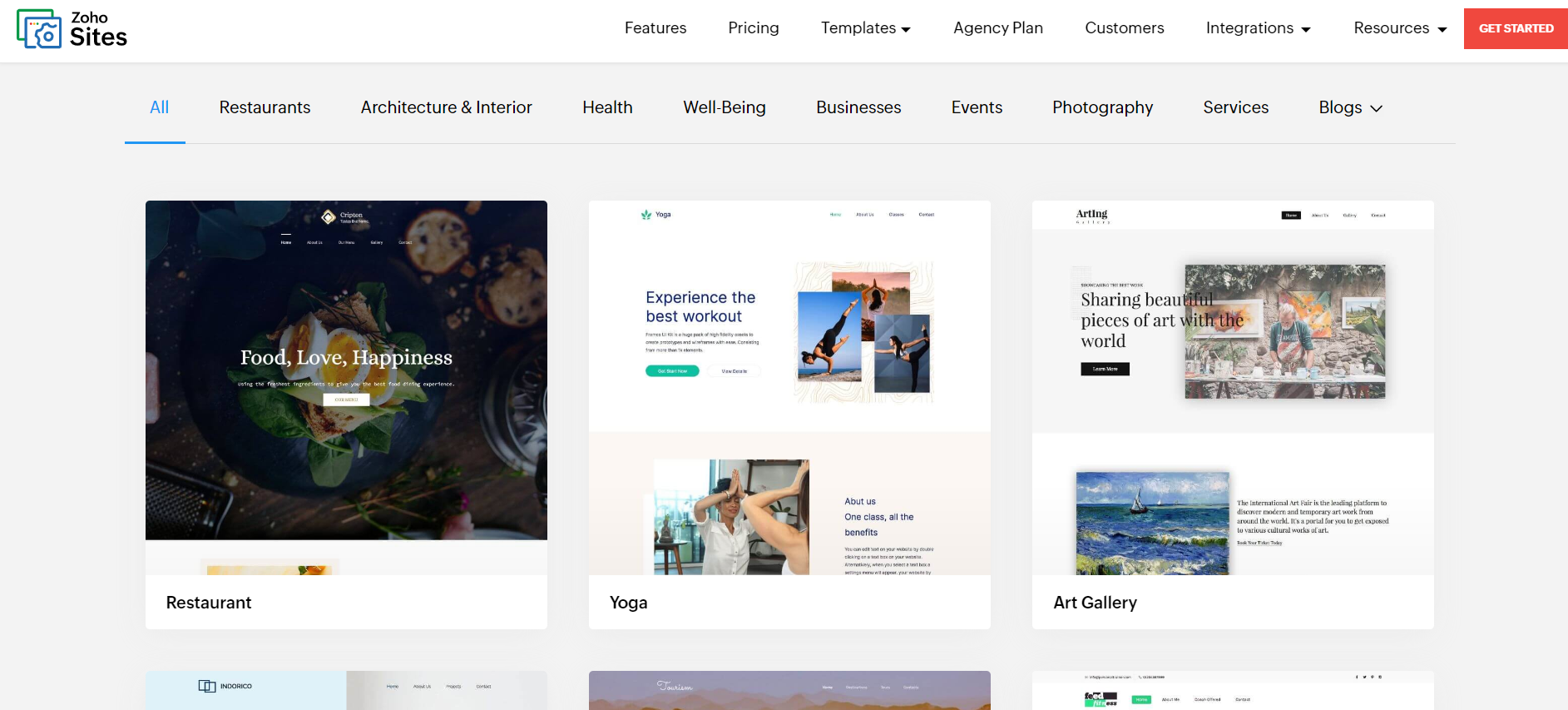

Get a head start on website creation with AI
Create a custom website tailored to your business needs 10X faster with 10Web AI Website Builder!
Ease of use
Ease of useReflects the platform’s overall user-friendliness.Score
Components:
- Learning curve (40%): Quickness and ease of getting started.
- Interface design (30%): Simplicity and intuitiveness of layout.
- User guidance (20%): Quality of tutorials and support.
- Flexibility (10%): Adaptability to various user skills.
 7.5
7.5
 7.0
7.0
🏆 Winner: Shopify
. With a score of 7.5, Shopify edges out Zoho Sites, which scored 7.0. Shopify is praised for its user-friendly design and comprehensive support, making it a more accessible platform for managing online stores. Zoho Sites, while offering a clean interface and logical workflows, may present a steeper learning curve for users requiring advanced features and seamless data integration.
Learning Resources
🏆 Winner: Tie
. Both Shopify and Zoho Sites offer extensive learning resources, including articles, tutorials, webinars, and video courses. These resources are well-written, informative, and designed to facilitate an easy and informative website building experience.
For ecommerce
EcommerceMeasures the platform’s effectiveness in supporting online business activities.Score Components:
- Ecommerce themes and templates (20%): Variety and design of templates.
- Product management (25%): Ease of managing and organizing products.
- Payment options (25%): Variety and convenience of payment methods.
- Ecommerce features (20%): Features for managing an ecommerce store.
- Integration (10%): Compatibility with external e-commerce tools and services.
 9.2
9.2
 7.4
7.4
Shopify is a leading ecommerce platform that provides a comprehensive set of features for online businesses. It offers tools for creating and customizing online stores, managing products, processing payments, and handling order fulfillment. On the other hand, Zoho Sites serves as a website builder for general purposes and lacks built-in ecommerce features. However, it seamlessly integrates with Zoho Commerce, a dedicated platform designed for online store management. This allows users to create a website with Zoho Sites and easily incorporate ecommerce functionality through Zoho Commerce, providing clarity, flexibility, and scalability for businesses of various sizes.

|
|
|
|---|---|---|
|
Ecommerce themes and templates |
8.2 |
6.5 |
|
Product page customization |
8.5 |
7.0 |
|
Payment processing and commissions |
8.8 |
6.8 |
|
POS capabilities |
8.1 |
5.5 |
|
Payment gateways |
9.5 |
7.2 |
|
Product numbers |
9.0 |
6.0 |
|
Additional ecommerce features |
9.1 |
7.3 |
Shopify ecommerce features:
- Comprehensive store builder
- Shopify Payments and other gateways
- Advanced inventory management
- Multi-channel selling
- Abandoned cart recovery
- Detailed analytics and reporting
Zoho Sites ecommerce features:
- Product and Inventory management
- Order management
- Payment Processing
- Marketing and Promotions
- SEO and Analytics
- Security
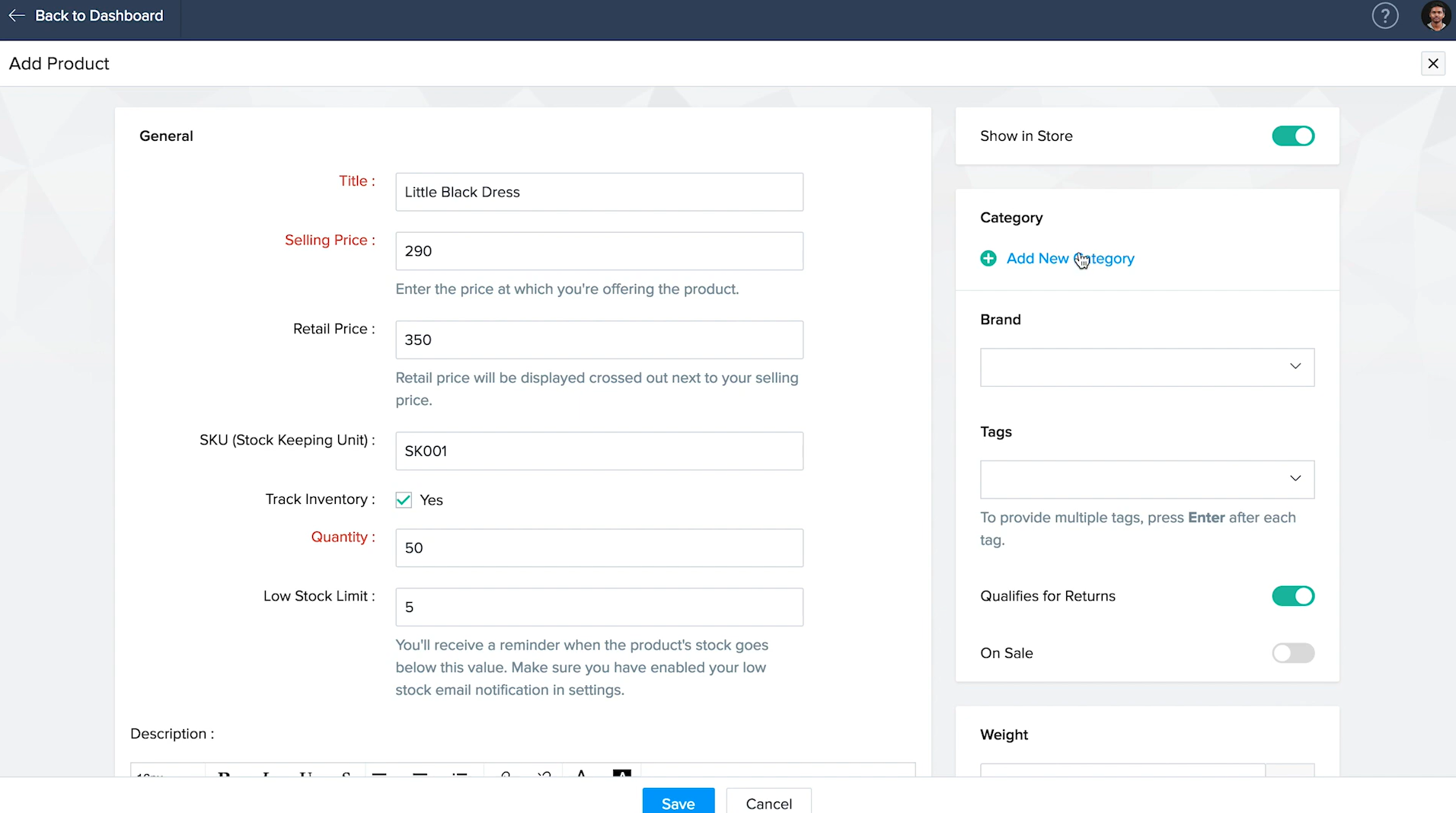
Ecommerce themes & templates
Shopify offers about 150 modern responsive themes for creating a virtual storefront, ensuring a good look on both desktop and mobile devices. While some themes are free, others cost between $170 to $380. In contrast, Zoho Sites offers a range of eCommerce website templates and themes designed to cater to various industries and business needs. These templates are customizable, allowing businesses to tailor their online stores to their brand and product offerings. Zoho Commerce, in particular, provides beautiful and highly customizable eCommerce store themes, aiming to enhance the online shopping experience.
Product page customization
Shopify has a limit of three options per product, totaling 100 unique variations. This limit may not pose a significant constraint, and it is suggested that for products with numerous options, creating separate listings on Shopify can be a more manageable approach. While Shopify offers titles, descriptions, and image galleries with zoom effects, customization options like adding ribbons, size charts, and wishlists are not as straightforward. However, Shopify distinguishes itself with additional features through its extensive library of extra apps, offering functionalities like reviews, Facebook stores, eBay item importers, and a unique Augmented Reality feature for an enhanced customer experience.
On the other hand, Zoho offers extensive product page customization options, allowing users to tailor the display of their products. This includes features like image galleries, sliders, and video integration, enabling businesses to present their products in a visually appealing manner. Additionally, Zoho facilitates the configuration of product variants like size and color options, as well as efficient inventory management directly from the product pages.
Payment processing
When it comes to payment processing, Shopify offers payments with typical charges of
2.9% + 30¢
per online transaction on basic plans, and lower fees for higher-tier plans. However, it adds extra fees for using other payment gateways. Shopify Payments is Shopify’s own payment processing gateway. It allows merchants to accept credit card payments directly on their store without having to integrate third-party payment providers. This simplifies the payment process, reduces transaction fees, and streamlines the handling of finances.
Zoho Sites, in conjunction with Zoho Commerce, offers robust payment processing capabilities and supports integration with multiple payment gateways like PayPal, Stripe, and Square, facilitating secure online transactions. While direct POS system integration and commission management might require leveraging additional Zoho tools or custom solutions, the Zoho ecosystem provides a comprehensive suite for businesses to manage both online and in-store sales efficiently. This integration ensures flexibility and security for businesses aiming to provide a seamless shopping experience across multiple channels.
Website Editors
Website EditorsEvaluates the platforms’ website building and editing capabilities.Score Components:
- Customization tools (40%): Range and power of editing features.
- Editor usability (30%): User experience within the editor.
- Design flexibility (20%): Freedom in layout and design changes.
- Update and maintenance ease (10%): Simplicity of updating and maintaining the site.
 7.9
7.9
 7.5
7.5
🏆
Winner: Shopify
. Shopify, with a score of 7.9, excels in providing a streamlined, ecommerce-focused editing experience. It’s particularly beneficial for users who prioritize efficient management of online stores. The editor is straightforward, making it easy to add products, manage inventory, and set up payment methods. Shopify’s editor is optimized for sales and business growth, with built-in tools specifically designed for ecommerce businesses.
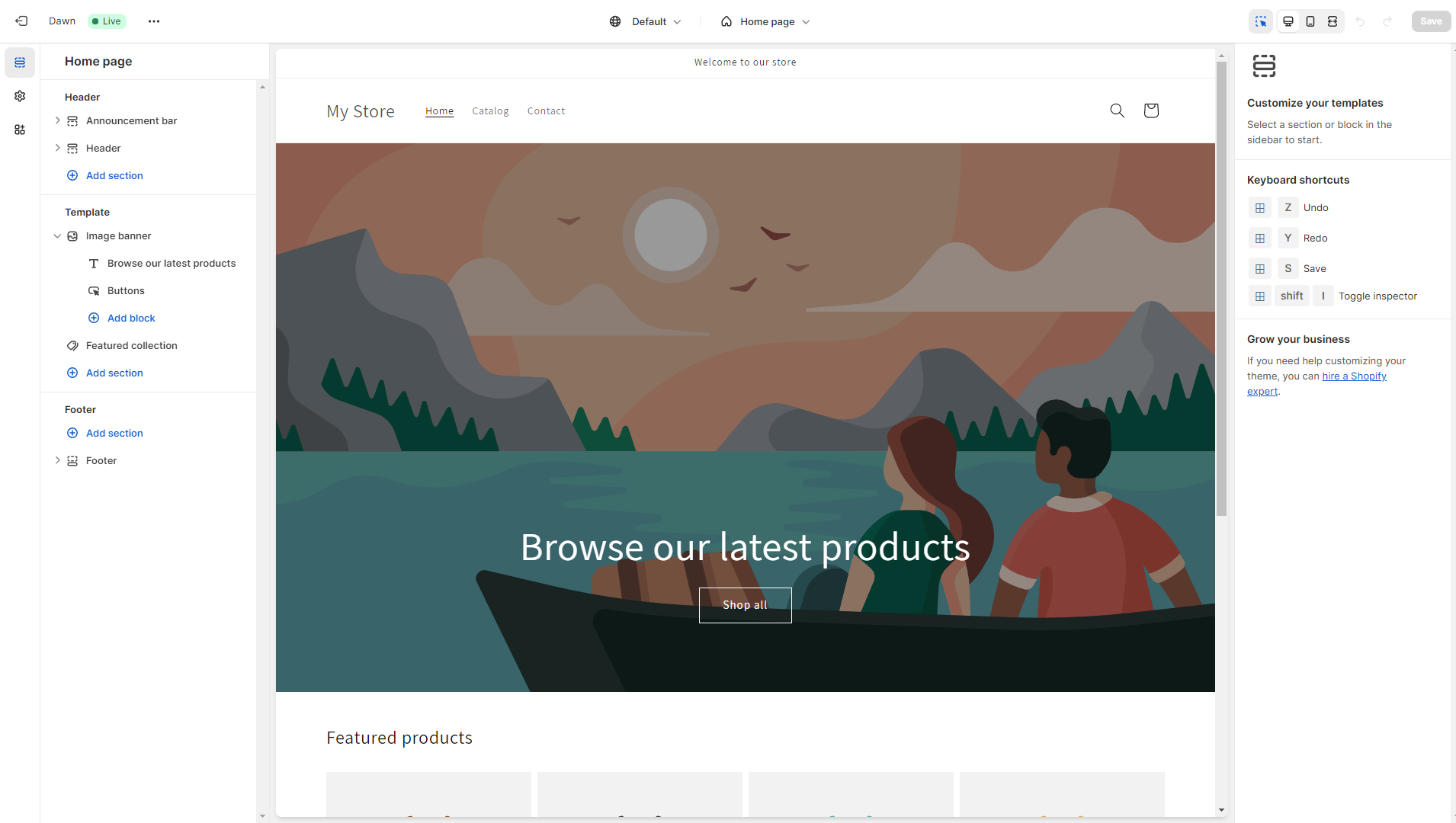
Zoho Sites’ editor, scoring 7.5, is a user-friendly website builder that enables both businesses and individuals to create professional, responsive websites without coding skills, through its drag-and-drop interface. Integrated within the Zoho ecosystem, it offers customizable templates, SEO tools, social media integration, and ecommerce features, along with connectivity to other Zoho applications for enhanced functionality.
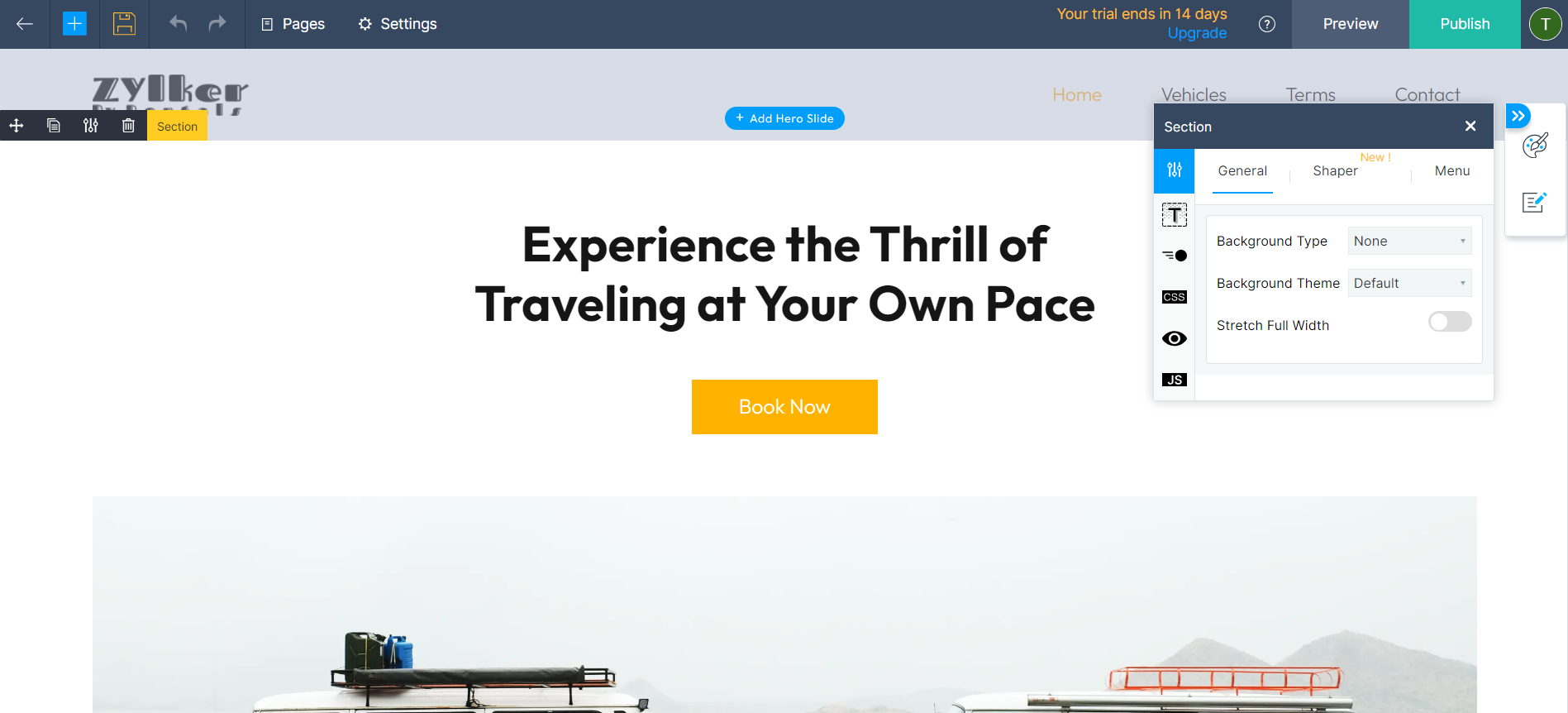
Mobile editor/app
 8.0
8.0
 5.5
5.5
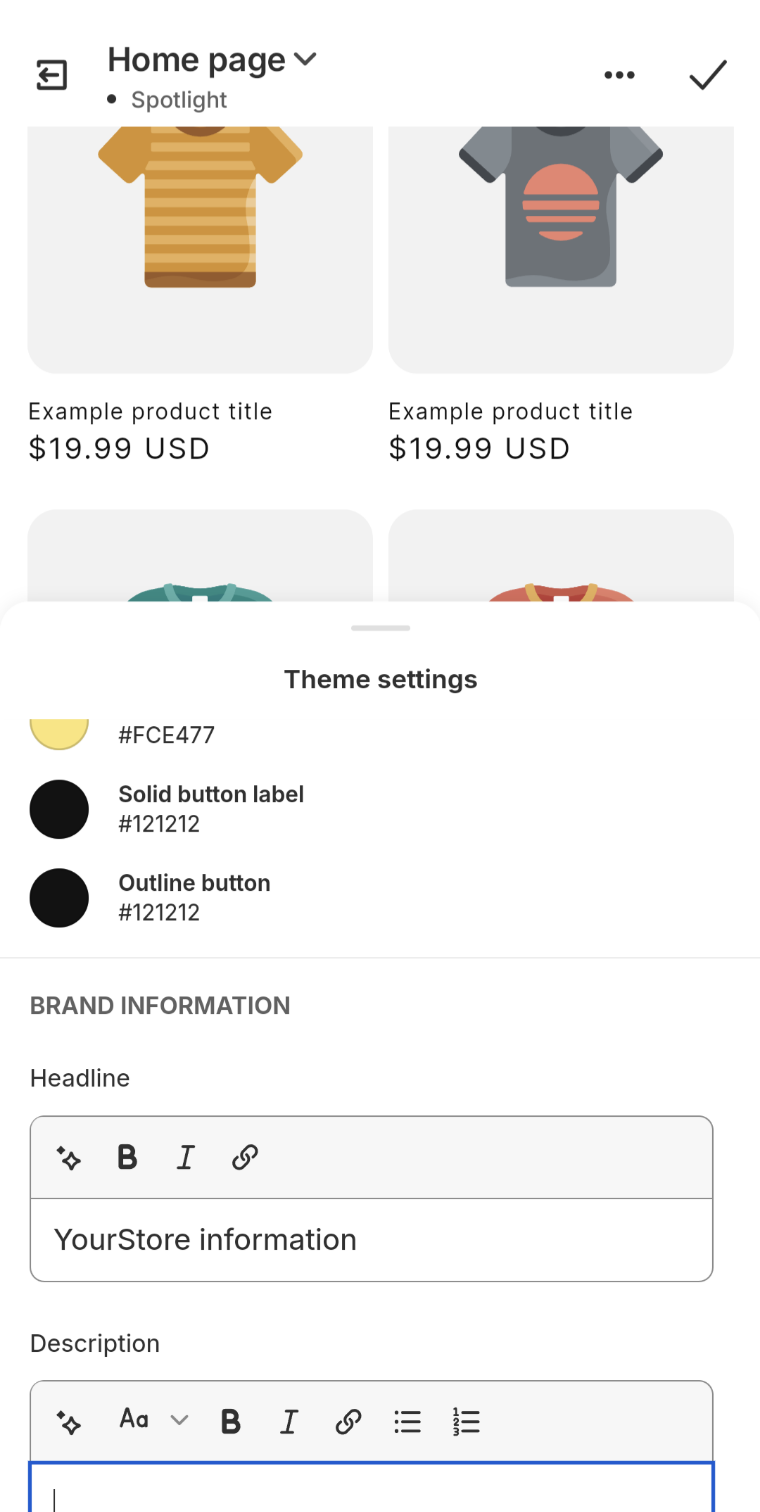
🏆
Winner: Shopify
. Both Shopify and Zoho Sites offer mobile editing capabilities, but they cater to different needs and skill levels. Shopify’s mobile app includes a user-friendly mobile theme editor that allows users to customize their online store website directly from their mobile device. This feature enables the addition, removal, editing, and rearrangement of content on the store’s website, offering convenient on-the-go adjustments to the store’s appearance and layout.
On the other hand, Zoho Sites currently does not have a dedicated website editor app. However, you can edit the visual aspects of the mobile version of your website, such as font size, color, background, and shadow, but you cannot change the content through the mobile interface.
In summary, Shopify receives a higher rating due to its comprehensive mobile editing capabilities and user-friendly interface, while Zoho Sites offers limited mobile editing features.
Product testing options
Product Testing OptionsAssesses the options for trying out platform features before commitment.Score Components:
- Trial quality (40%): Extent and usefulness of the trial or free version.
- Feature accessibility (30%): How many features are available to test.
- Trial duration (20%): Length of the trial period.
- Ease of transition (10%): Smoothness of moving from trial to paid plans.
 8.1
8.1
 8.8
8.8
Overall Result
:
Zoho Sites Wins
. Zoho Sites scores 8.8, slightly higher than Shopify’s 8.1. Both platforms offer a free trial, with Zoho Sites providing a slightly longer duration of 15 days compared to Shopify’s 14 days. Both platforms also allow testing of all features during the trial period. However, Zoho Sites offers a more flexible money-back guarantee, providing a full refund within the first 30 days for monthly subscriptions and a 45-day window for annual subscriptions.

|
|
|
|---|---|---|
|
Free Plan |
No |
Yes |
|
Trial Duration |
14 days |
15 days |
|
Testing Premium Features |
All features during free trial |
All features of each plan during trial |
Price
PriceLooks at the cost-effectiveness and value for money of each platform.Score Components:
- Plan value (40%): What each pricing tier offers.
- Transparency and clarity (30%): Clearness of pricing structures.
- Flexibility of plans (20%): Range of options to suit different budgets.
- Hidden costs (10%): Additional expenses not included in the plan.
 8.2
8.2
 8.6
8.6
Zoho Sites offers a more affordable range of plans and higher discounts on annual subscriptions, but Shopify provides more comprehensive features, especially for larger-scale ecommerce operations.

|
|
|
|---|---|---|
|
$0-$10 |
No offering at this amount. |
Starter ($8.00/month): Offers basic features suitable for small websites, including 5 pages, 500MB storage, 10GB bandwidth/month, SSL hosting, domain connection, ad-free experience, and more. Ideal for personal blogs or small business websites. Value for price: 6.5 |
|
$20-$25 |
No offering at this amount. |
Pro ($23.00/month): Upgrades significantly on the Starter plan, offering 50 pages, 100GB storage, unmetered bandwidth, 50 forms, and advanced features like social share button, audio player, comment box, scheduled blog post, and dynamic content. Best suited for professional sites that require more resources and functionalities. Value for price: 8.0 |
|
$25-$40 |
Shopify Basic ($29/month): Unlimited products, 2.9% + 30¢ card fee with Shopify payments, Extra 2% gateway fee without Shopify Payments, Abandoned cart recovery, Automated sales tax, Digital products, POS Integration, 2 staff accounts. Value for price: 8.0 |
Agency ($32.00/month): Tailored for agencies managing multiple sites, providing a bundle plan that offers significant savings and flexibility. Includes all Starter features with the option to add Pro features as needed. Value for price: 9.0 |
|
$70-$80 |
Shopify Standard ($79/month): Lower card fees (2.6% + 30¢), Gift cards, Professional reports, 5 staff accounts. Value for price: 8.5 |
No offering at this amount. |
|
$200+ |
Advanced Shopify ($299/month): Lowest card fees (2.49% + 30¢), Advanced report builder, Real-time carrier shipping, Up to 15 staff accounts Value for price: 8.8 |
No offering at this amount. |
location. As a result in rare cases the prices displayed here can differ from the ones you see on their
websites.
Hosting quality
Hosting
qualityExamines the reliability and performance of the hosting solutions.Score Components:
- Uptime (40%): Consistency and reliability of website availability.
- Speed (30%): Loading times and performance.
- Bandwidth and storage (20%): Sufficiency of resources provided.
- Data centers (10%): Quality and distribution of hosting infrastructure.
 9.0
9.0
 8.0
8.0
Winner: Shopify
. Shopify’s proprietary cloud-based hosting, with a 99.99% uptime guarantee and 5 global data centers, is designed for high-traffic online stores. Zoho Sites, on the other hand, offers managed hosting with a 99.9% uptime guarantee and 12 global data centers, catering to various needs with its scalable shared web hosting service. However, Shopify’s specialized reliability gives it a slight edge.

|
|
|
|---|---|---|
|
Do they offer hosting? |
Yes, included in all paid plans |
Yes, included in all paid plans, with varying storage and bandwidth |
|
Data Centers: |
5 globally: USA (Ashburn, Virginia; Santa Clara, California), Canada (Toronto, Ontario), Ireland (Dublin), and Singapore |
12 Globally: Canada(Montreal and Toronto), US(Quincy and Dallas), India(Mumbai and Chennai), Australia(Sydney and Melbourne), China(Beijing and Shanghai), Japan(Tokyo and Osaka) |
|
Type of hosting: |
Proprietary cloud-based hosting |
Managed Hosting |
|
Uptime: |
99.99% |
99.9% |
|
Uptime Guarantee: |
Yes, 99.99% |
Yes, 99.9% |
Website Speed Optimization
Website Speed OptimizationEvaluates optimization of website loading timesScore Components:
- PageSpeed Score (30%): Google’s score indicating performance optimization.
- Loading Time (30%): The average time until a website is fully interactive.
- Mobile Optimization (15%): Optimization effectiveness for mobile devices.
- Resource Optimization (15%): Optimizing images, scripts, and other heavy resources.
- CDN Usage (10%): Use of CDN to enhance speed across geolocations.
 7.8
7.8
 7.1
7.1
🏆 Winner: Shopify
Both Shopify and Zoho Sites place a high priority on website performance and page speed, with Shopify focusing on app and theme optimization and Zoho Sites emphasizing regular testing, optimized code and libraries, and cache balancing. However, Shopify gets a slight edge when it comes to website speed optimization.

|
|
|
|---|---|---|
|
Focus |
App optimization, Theme optimization |
Regular testing, Optimized code and libraries, Cache balancing |
|
Performance Tools |
Google Lighthouse, PageSpeed Insights |
Google PageSpeed Insights Integration |
|
Key Strategies |
App efficiency, Theme optimization |
Regularly testing and implementing updates, Optimized code and libraries, Cache balancing |
|
Load Times |
Varies widely, dependent on optimization |
Below 2-5 seconds average |
|
Page Speed Scores Range |
Scores vary; influenced by apps, images |
70-80/100 average |
|
Core Web Vitals Improvement |
Emphasis on LCP, FID, CLS improvements |
Implementing various performance optimization techniques |
Shopify’s approach to enhancing site speed includes app optimization by removing unneeded app code, conditionally loading apps, avoiding immediate pop-up displays, and incorporating app functionality directly into themes. This approach leverages Shopify’s fast servers and CDN network to boost load speed. Shopify also suggests utilizing Google AMP for faster mobile page loads, although with some design compromises. Analysis of three Shopify sites showed a range of Shopify speed scores from 14 to 75, Google PSI scores from 8 to 80, and load times varying from 10.6 seconds to 2.3 seconds. Continuous maintenance and optimization are essential for keeping Shopify stores fast.
Zoho Sites, on the other hand, focuses on regular testing and implementing updates, optimized code and libraries, and cache balancing for speed optimization. It has an average load time of 2-5 seconds and an average PageSpeed score of 70-80/100. Zoho Sites also emphasizes implementing various performance optimization techniques for improving Core Web Vitals. However, the specific strategies and results of these techniques are not detailed in the provided information.
Get a head start on website creation with AI
Create a custom website tailored to your business needs 10X faster with 10Web AI Website Builder!
Plugins and integrations
Plugins and integrationsMeasures the range and effectiveness of additional plugins and integrations.Score Components:
- Variety of options (40%): Range of available add-ons.
- Integration smoothness (30%): Ease of integrating plugins into the site.
- Quality of plugins (20%): Functionality and reliability of the options.
- Custom integration capabilities (10%): Support for custom or third-party integrations.
 8.7
8.7
 7.3
7.3
🏆 Winner: Shopify.
With a score of 8.7, Shopify outperforms Zoho Sites, which scores 7.3. Shopify offers over 8,000 apps in its App Store, covering a wide range of functionalities. These apps come with various pricing options, including free, paid, freemium, and one-time payment models. On the other hand, Zoho Sites offers a diverse range of plugins and extensions spanning various categories like marketing, design, social media, SEO, payments, and more. However, the number of plugins is estimated to be in the hundreds, which is significantly less than Shopify. Therefore, Shopify is the winner in this category.
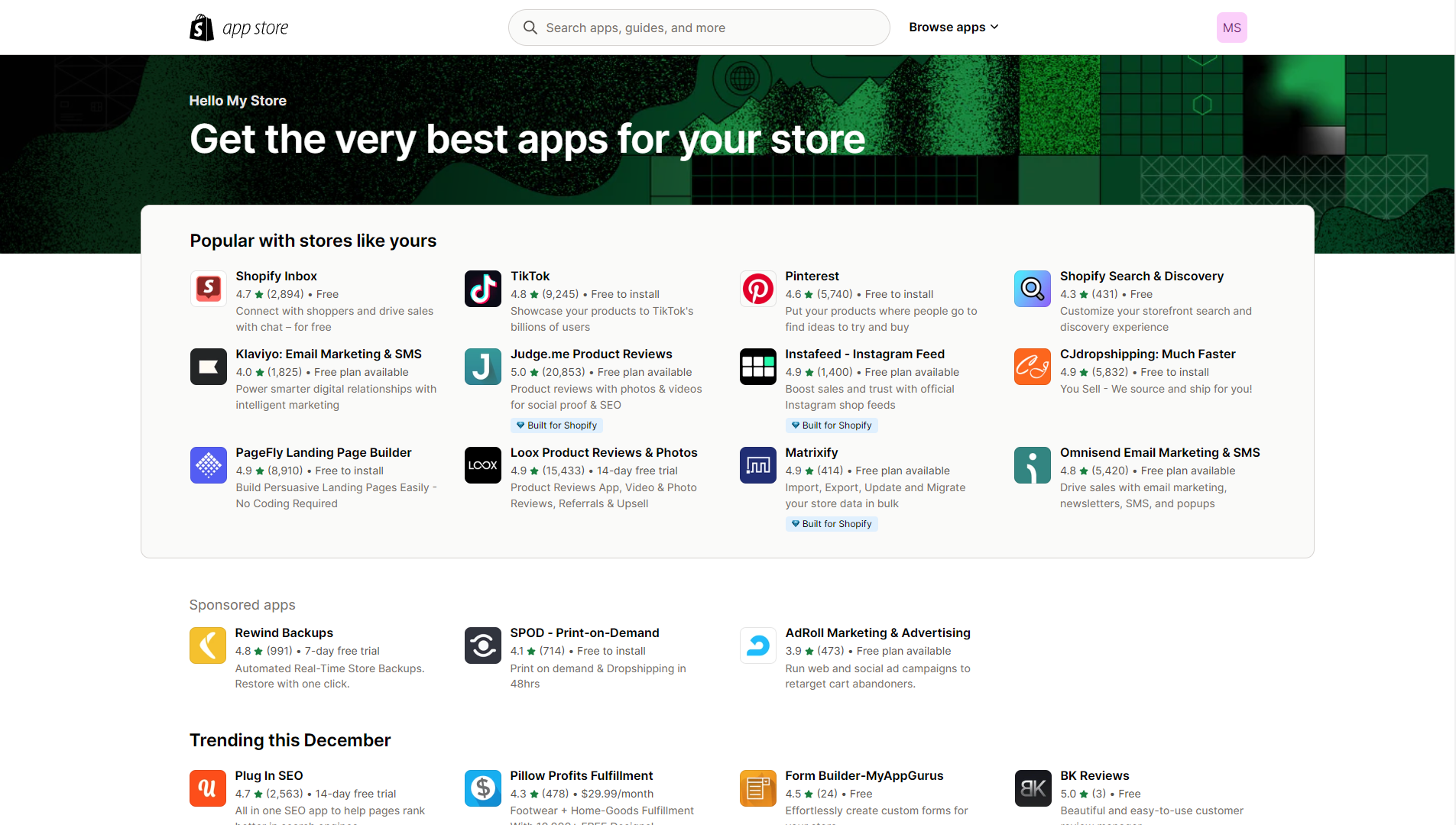
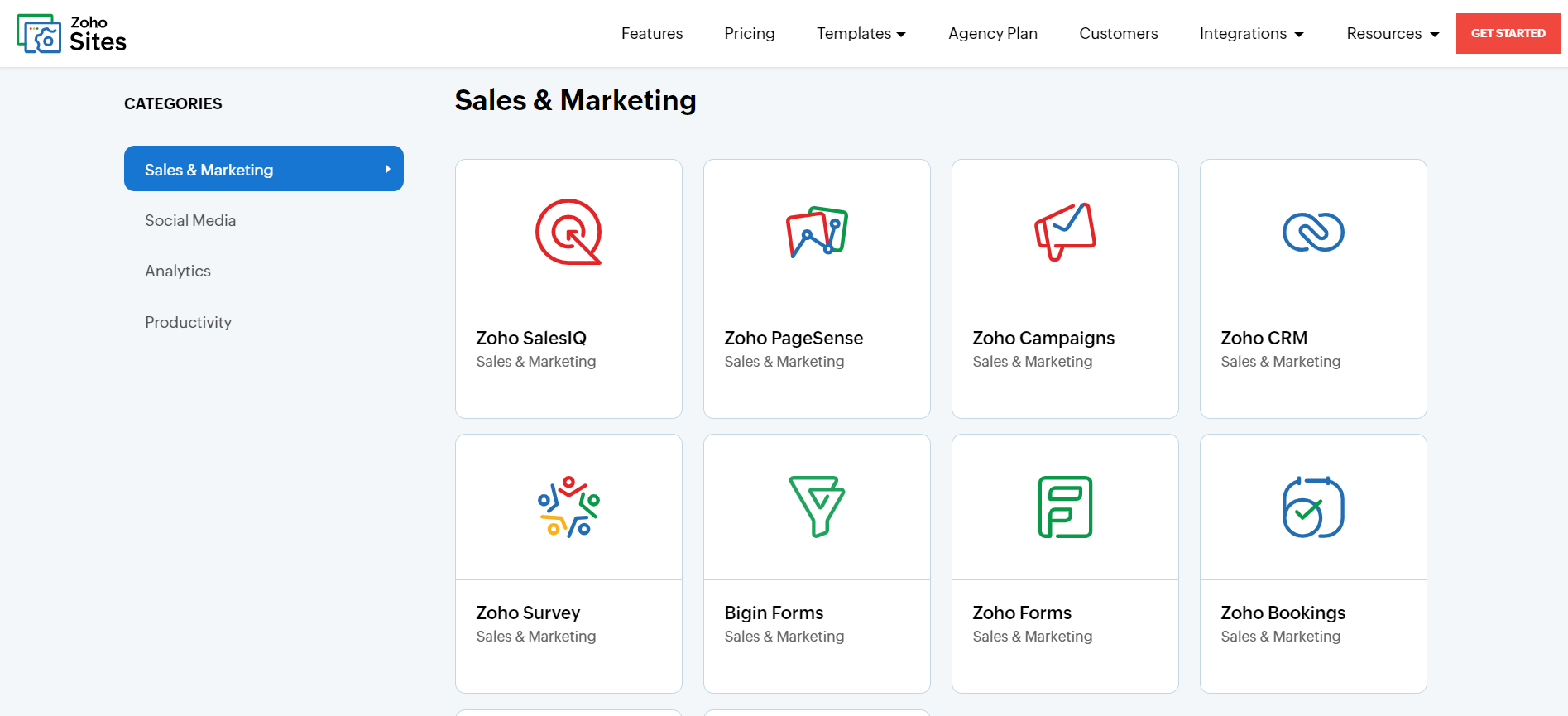
Marketing Features
Marketing featuresAssesses tools and options available for marketing.Score Components:
- SEO tools (40%): Effectiveness of SEO features.
- Marketing automation (30%): Availability and quality of marketing tools.
- Social Media integration (20%): Ease and depth of social media connectivity.
- Email marketing (10%): Quality and usability of email marketing tools.
 8.8
8.8
 7.6
7.6
🏆
Overall Winner: Shopify
. Shopify stands out for its more advanced ecommerce-focused marketing tools, especially in analytics and ad campaign management. Zoho Sites offers a range of marketing tools integrated with other Zoho applications, making it a good choice for users already using Zoho’s ecosystem.

|
|
|
|---|---|---|
|
SEO Tools |
|
|
|
Email Marketing |
|
|
|
Blogging |
|
|
|
Social Media Integration |
Advanced integration for selling directly on social platforms |
Integration with Zoho’s ecosystem |
|
Analytics and Reporting |
Detailed analytics for in-depth insights |
Traffic analytics and Google Analytics integration |
|
Ads and Promotions |
Google Ads integration; sophisticated ad campaign management |
Integrated with Zoho Marketing Automation |
Customer Support
Customer supportEvaluates the quality and availability of support options.Score Components:
- Response time (40%): Speed of support responses.
- Support quality (30%): Effectiveness and helpfulness of the support.
- Availability (20%): Range of support channels (phone, chat, email).
- Resource richness (10%): Quality of self-help and educational materials.
 8.6
8.6
 8.3
8.3
🏆 Winner: Shopify
. Shopify edges out Zoho Sites with a customer support score of 8.6 against Zoho Sites’ 8.3. Shopify provides 24/7 support through chat, email, and phone, along with clear and beneficial tutorials. The extensive community ensures that answers can be found in the numerous forum threads. Additionally, Shopify’s outstanding marketing blog offers valuable information on business growth strategies.
Zoho Sites also offers robust customer support through various channels including live chat, email, and phone. Their support team is available 24/7 to assist customers with any queries or issues they may have. Additionally, Zoho Sites provides a comprehensive knowledge base and community forum where users can find answers to common questions and interact with other users.
Security
SecurityLooks at the platforms’ security measures and data protection.Score Components:
- Data protection (40%): Safeguards for user and customer data.
- SSL and encryption (30%): Implementation of secure connections.
- Compliance (20%): Adherence to industry security standards.
- Regular updates (10%): Frequency of security updates and patches.
 9.0
9.0
 8.1
8.1
🏆
Winner: Shopify
. Shopify’s security measures are more comprehensive than Zoho Sites. Shopify prioritizes data privacy and security through rigorous measures, including secure infrastructure, encryption, and limited access. They comply with data privacy regulations, practice data minimization, and ensure user control and transparency. Additional security measures include two-factor authentication, regular audits, and a dedicated incident response team. Shopify also ensures website security with SSL certificates encrypting data, verifying website identity, and offering SEO benefits. Free SSL certificates are provided, with options for upgrades. The built-in Web Application Firewall filters and blocks threats, and users can add third-party firewalls for extra control and security.
Zoho Sites, on the other hand, offers secure private data storage and protection through advanced encryption and access controls. Your data is stored in highly secure data centers and is regularly backed up to ensure its safety and availability. Zoho Sites provides a secure environment for website creation and management. The platform uses SSL encryption to protect data transmission and offers two-factor authentication for added security. Additionally, Zoho Sites regularly updates its software to address any potential vulnerabilities. However, compared to Shopify, Zoho Sites’ security measures are not as extensive.
AI Capabilities
AI capabilitiesMeasures the effectiveness of AI-driven features and tools.Score Components:
- Automation efficiency (40%): Impact of AI on streamlining processes.
- Personalization (30%): AI-driven customization for users or customers.
- AI-Assisted design (20%): Role of AI in website design and functionality.
- Data analysis (10%): Use of AI in interpreting user data and analytics.
 7.9
7.9
 7.5
7.5

|
|
|
|---|---|---|
|
AI Website Builder |
Shopify AI Builder offers a range of functionalities |
|
|
SEO Optimization |
AI-driven recommendations for better search engine visibility |
|
|
Customer Behavior Analysis |
Advanced analytics to understand customer preferences |
|
|
Sales Predictions |
AI-powered sales forecasting tools |
Zoho’s AI assistant Zia provides sales predictions |
|
Inventory Management |
AI tools to assist in efficient inventory handling |
|
|
Content Generation |
AI features Content Assistant for creative content generation |
Zia, Zoho’s AI content assistant, offers intelligent suggestions |
🏆 Winner: Shopify
. Shopify, with a score of 7.9, utilizes AI mainly to enhance the ecommerce experience. Its AI features focus on customer behavior analysis, personalized shopping experiences, inventory management, and sales predictions. While Shopify’s AI is powerful, it is more business and data-centric compared to Zoho Sites.
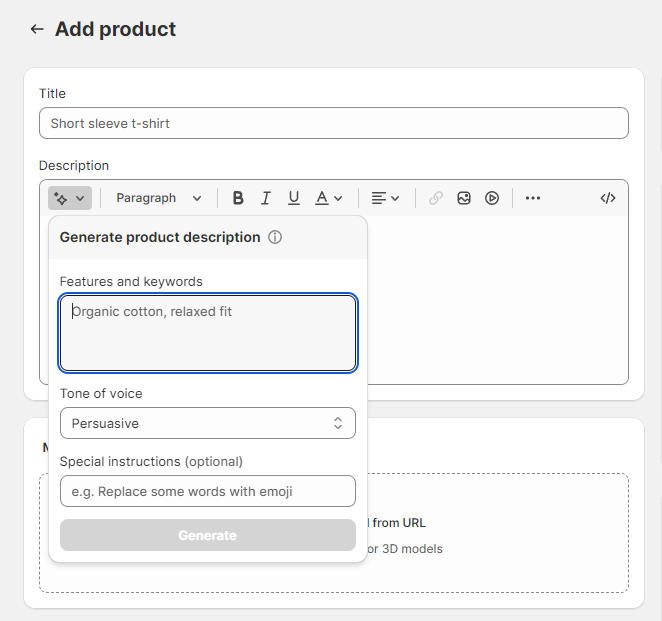
Zoho Sites, scoring 7.5, leverages AI for content generation and offers some AI-backed ecommerce features. However, it does not have an AI website builder, which puts it at a disadvantage compared to Shopify.
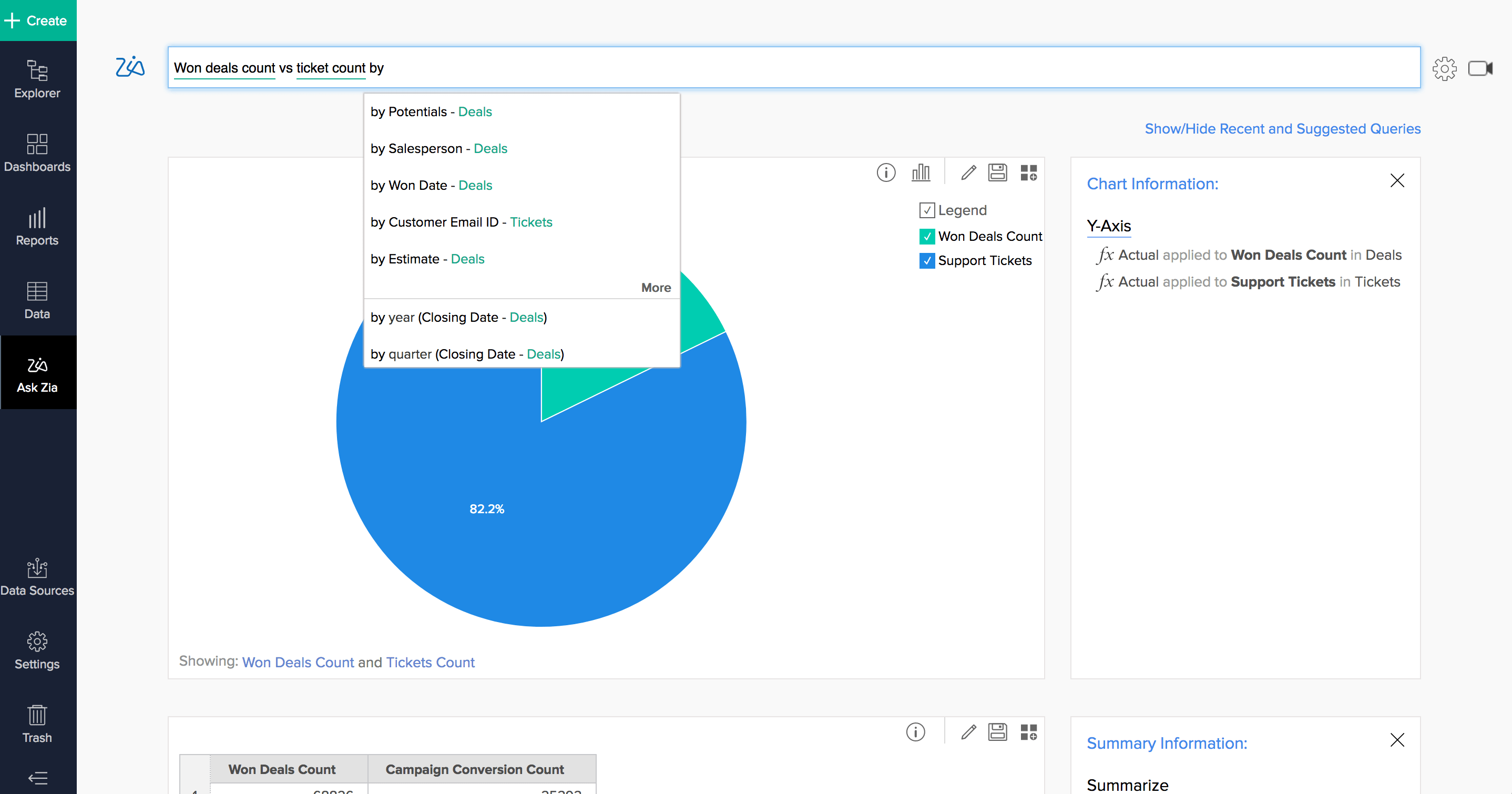
User Management
User ManagementAssesses the platforms’ capabilities in managing user roles, permissions, and accessibility.Score Components:
- Role Customization (40%): Flexibility in creating and defining user roles and
permissions. - Ease of Management (30%): User interface and tools for managing users.
- Access Control (20%): Effectiveness of access control measures for different user
levels. - Scalability (10%): Ability to manage a growing number of users efficiently.
 6.5
6.5
 7.3
7.3
🏆 Winner: Zoho Sites
. Managing your online team with Shopify and Zoho Sites involves different approaches to website editing access.
-
Shopify enforces staff account limits based on plans, ranging from 2 to 15, with Shopify Plus offering unlimited
accounts. Collaborators with limited access are also an option. - The number of users who can edit a Zoho Sites website and their access levels depend on the chosen plan. The Free Plan allows only the owner to edit, while paid plans like Pro, Business, and Enterprise offer access for up to 10, 25, and 50 users respectively. Zoho Sites provides four access levels: Admin, with full editing rights and user management; Contributor, who can edit content and create pages but not manage collaborators; and Author, limited to editing text content without access to settings or user management.
Shopify User Roles and Access Levels:
| Role | Description | Access Highlights |
|---|---|---|
| Store Owner | Full control over store | Manage products, orders, discounts, payments, apps, settings. Create and manage staff accounts. |
| Staff | Configurable access by owner |
Add/edit products, manage orders, fulfill orders, manage customers, update content. Access level can be customized by the owner. |
| Collaborator | Limited access for external partners | View and manage specific sections like blog or product categories. Cannot access full store settings. |
Additional Features

|
|
|
|---|---|---|
|
SSL Certificate |
|
|
|
Custom Domain |
|
|
|
Free Custom Domain Included |
|
|
|
International Domains |
|
|
|
Mobile Responsive |
|
|
|
Page Speed |
|
|
|
Website Builder Mobile App |
|
|
|
Convert a Website To An App |
|
|
|
Website Analytics |
|
|
|
Multilingual Sites |
|
|
|
Multiple Users |
|
|
User Feedback
Shopify’s slightly higher rating on G2 Crowd can be largely attributed to its specialization in ecommerce. Its comprehensive features, ease of use, and robust customer support cater specifically to online businesses, leading to high user satisfaction among those seeking a dedicated ecommerce solution.
Zoho Sites receives mixed reviews, with users praising its user-friendly interface, extensive template library, and seamless integration with other Zoho products, which simplifies website development and management for small businesses. However, some users express dissatisfaction with its limited design flexibility and the inability to create custom features. Overall, Zoho Sites addresses the need for cost-effective website solutions, particularly for those without coding knowledge, offering a one-stop-shop for building and managing websites with varying degrees of customization and integration with other business tools.
The making of this blog
We followed a clear, step-by-step process to write and research this article.
FAQ
Which platform is better for ecommerce, Shopify or Zoho Sites?
Can I use Zoho Sites for a business website that's not focused on ecommerce?
How do Shopify and Zoho Sites compare in terms of design and customization?
Which platform offers better value for money?
Are there any differences in hosting quality and website speed optimization between Shopify and Zoho Sites?
Which platform has better customer support?
How do Shopify and Zoho Sites handle security?
Can I manage a team with either Shopify or Zoho Sites?










